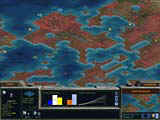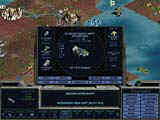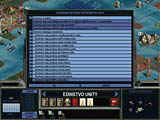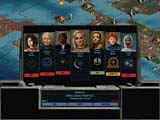 |
|
|
|||||||||||||
 I’ve always thought that a major reason for the
popularity of the 4X "god game" genre—which includes games like
Civilization and Civilization II and now Sid Meier’s Alpha Centauri—was that it
let you act out your fantasies of control on a world-historical scale. I mean, there's
nothing that quite compares to obsessively ushering every aspect of a civilization—your
civilization--from its unwashed beginnings to ultimate global domination. It kind of
spoils you for games whose goals are less epic, you know, stuff like killing deer or
whipping up on the local zombies or winning World War II. I’ve always thought that a major reason for the
popularity of the 4X "god game" genre—which includes games like
Civilization and Civilization II and now Sid Meier’s Alpha Centauri—was that it
let you act out your fantasies of control on a world-historical scale. I mean, there's
nothing that quite compares to obsessively ushering every aspect of a civilization—your
civilization--from its unwashed beginnings to ultimate global domination. It kind of
spoils you for games whose goals are less epic, you know, stuff like killing deer or
whipping up on the local zombies or winning World War II. The genre’s high water mark was reached with 1996’s Civilization II, a game so good that the only fault anyone could find was its lack of multiplayer. And everyone, of course, expected a quick sequel. Ha. Ha ha. Much sordid legal wrangling over trademarks held up development of Civ III, finally leaving Activision with rights to the franchise. (Their god game--Civilization: Call to Power--should be released in the next couple of weeks.) Unfortunately, these dreary squabblings also left the men most responsible for the first two games—Sid Meier (to games as Hendrix is to guitars) and Civ II ubermeister Brian Reynolds—more or less frozen out of the franchise’s future. Undaunted, the two formed up their own company, Firaxis games. Their first release, Sid Meier’s Gettysburg!, was a smash success that got the company off to a fine start and whetted Civ fan’s appetites for the upcoming Alpha Centauri—the game that takes up where Civ II left off.  OK, before I get too far into the review I have to address the "is this
just Civ II in space?" question, even though I find it tedious and annoying. The
answer is, in many ways, yes. If you’ve played Civilization II, you’ll find many
of SMAC’s general game concepts and mechanics to be quite familiar. I seem to be one
of the few that finds this to be a good thing. I mean, I loved Civ II, and I really
didn’t want the sequel to be a turn-based/ real-time hybrid that included jumping
into a 3D battlefield to fight off invaders. But the answer is also, in many ways, no.
Though the overall form of SMAC is much like Civ II’s, there are many differences
that lend the game a sense of depth and vision that its predecessor lacked. OK, before I get too far into the review I have to address the "is this
just Civ II in space?" question, even though I find it tedious and annoying. The
answer is, in many ways, yes. If you’ve played Civilization II, you’ll find many
of SMAC’s general game concepts and mechanics to be quite familiar. I seem to be one
of the few that finds this to be a good thing. I mean, I loved Civ II, and I really
didn’t want the sequel to be a turn-based/ real-time hybrid that included jumping
into a 3D battlefield to fight off invaders. But the answer is also, in many ways, no.
Though the overall form of SMAC is much like Civ II’s, there are many differences
that lend the game a sense of depth and vision that its predecessor lacked.
One of these differences is the game’s setting and premise. In SMAC, you take control of one of seven factions that have fled earth in a spaceship and seek to colonize a habitable world in the Alpha Centauri system. Though initially launched under the auspices of the United Nations, the mission hits a snag when the ship’s passengers are awakened from cryosleep four years early. Of course, the delights of faction soon make themselves known, and by the time the ship reaches the planet (named, with a flourish of originality, Planet), its passengers have divided themselves into seven distinct factions.  One of the intriguing things about the factions is that they
are divided not by race or nationality, but by ideology. The Morganites (in a tribute to
J.P. Morgan, perhaps?) are hardcore capitalists who want to turn a buck above all other
things, the Gaians are environmentalists whose primary wish is to live in peace with the
planet, and the Spartans are survivalists with a military bent and a nasty temper. The
University of the Planet’s faction is hell-bent on research and ensuring free flow of
information, no matter what the ethical costs, and The Believers are a group of testy
religious fundamentalists who think of the planet as their promised land. The Human Hive
embraces a pretty fair approximation of Stalinist principles--authoritarian, isolationist,
and militaristic; and the Peacekeeping Forces—your everyday humanists--take it upon
themselves to try to keep these diverse factions from each other’s throats. This, of
course, is a forlorn hope; some factions are just hopelessly incompatible—Morganites
and Gaians, for instance, don’t have a lot to talk about—and the Spartans will
pick a fight just for the pure T hell of it. Finally, the planet itself is a
faction—if you abuse it, it will make you pay, usually by sending boils of mind
worms--a very nasty indigenous life form--after your units. One of the intriguing things about the factions is that they
are divided not by race or nationality, but by ideology. The Morganites (in a tribute to
J.P. Morgan, perhaps?) are hardcore capitalists who want to turn a buck above all other
things, the Gaians are environmentalists whose primary wish is to live in peace with the
planet, and the Spartans are survivalists with a military bent and a nasty temper. The
University of the Planet’s faction is hell-bent on research and ensuring free flow of
information, no matter what the ethical costs, and The Believers are a group of testy
religious fundamentalists who think of the planet as their promised land. The Human Hive
embraces a pretty fair approximation of Stalinist principles--authoritarian, isolationist,
and militaristic; and the Peacekeeping Forces—your everyday humanists--take it upon
themselves to try to keep these diverse factions from each other’s throats. This, of
course, is a forlorn hope; some factions are just hopelessly incompatible—Morganites
and Gaians, for instance, don’t have a lot to talk about—and the Spartans will
pick a fight just for the pure T hell of it. Finally, the planet itself is a
faction—if you abuse it, it will make you pay, usually by sending boils of mind
worms--a very nasty indigenous life form--after your units.
By the way, the portraits of each faction’s leader are both nicely done and nicely diverse. Only one white guy—and he’s a Russian—shows up as a faction leader. The leader of the Morganites is a dapper black man, the Peacekeeper’s leader is an East Indian man, and the Human Hive’s leader has the look of an Oriental Dennis Rodman. Three of the factions are headed up by women: the Spartan’s ass-kicking Hispanic Colonel Santiago, the Believer’s severe Sister Miriam, and the Gaian’s demure and Gaelic Deirdre. It’s nice to see a vision of the future that’s not exclusively—or even predominately—white and male.  Each faction also has its own strengths and weaknesses. For instance, the
Spartans have high morale but eschew wealth, which doesn’t do much for their economy;
on the other hand, Believers fight fanatically but distrust secular science, so their
research efforts are hamstrung. The factions add a nice role-playing aspect to the game,
and the manual wisely suggests you choose a faction that you can identify with. Though
some have complained that the factions lack personality, and that their choices of economy
and weaponry should be more restricted than they are—for instance, the fungus-hugging
Gaians can make nukes and use ‘em if they want—I frankly disagree. Historically,
ideological factions invariably change over time and oftentimes gleefully embrace
contradictions. That can happen in the game--and if it does, it happens because of a
player’s conscious abandonment of his or her ideological commitments. You want to
betray your free market or religious principles for expediency’s sake, you can go
right ahead and do so. Just like in real life. Each faction also has its own strengths and weaknesses. For instance, the
Spartans have high morale but eschew wealth, which doesn’t do much for their economy;
on the other hand, Believers fight fanatically but distrust secular science, so their
research efforts are hamstrung. The factions add a nice role-playing aspect to the game,
and the manual wisely suggests you choose a faction that you can identify with. Though
some have complained that the factions lack personality, and that their choices of economy
and weaponry should be more restricted than they are—for instance, the fungus-hugging
Gaians can make nukes and use ‘em if they want—I frankly disagree. Historically,
ideological factions invariably change over time and oftentimes gleefully embrace
contradictions. That can happen in the game--and if it does, it happens because of a
player’s conscious abandonment of his or her ideological commitments. You want to
betray your free market or religious principles for expediency’s sake, you can go
right ahead and do so. Just like in real life.
Of course, you can also look at this as evolution rather than apostasy. One of great things about Alpha Centauri is its sense of possibility. Whereas Civ II ended in the near future, Alpha Centauri begins there. You pretty much knew what was going to happen in Civ II, but with Alpha Centauri you’re in uncharted territory. This sense of creating a future, rather than recreating a past, gives SMAC a sense of vision that earlier god games lacked. And since you can win in four different ways—through conquest, diplomacy, economics, or "transcendence," games don’t necessarily end with the "last man standing." The provision for allied victories is a nice touch as well.  The game’s expanded vision is complemented by its
increased depth of gameplay. Make no mistake, this game has a very steep learning curve.
On any given turn you might find yourself building additions to your bases, overseeing
resource production for each base, building specialized units and putting them into
production, conducting terraforming operations, managing your economy, making decisions on
your research agenda, deciding what sort of government you’d like to institute,
conducting diplomacy, and, of course, fighting wars. This micromanaging can be
exhilarating; it can also, at times, become overwhelming and even tedious. Fortunately,
you can automate some of these decisions; each settlement has an automatic governor who
can be given a fairly specific agenda, and terraformers can be automated as well. Though
neither of these auto features will govern nearly as well as you can, they’re a great
tool for beginners or for when your empire outgrows your attention span. The game’s
interface is excellent as well; most of the basic information or commands you’ll need
are on the main screen, and the deeper stuff is only a click or hotkey away. The game’s expanded vision is complemented by its
increased depth of gameplay. Make no mistake, this game has a very steep learning curve.
On any given turn you might find yourself building additions to your bases, overseeing
resource production for each base, building specialized units and putting them into
production, conducting terraforming operations, managing your economy, making decisions on
your research agenda, deciding what sort of government you’d like to institute,
conducting diplomacy, and, of course, fighting wars. This micromanaging can be
exhilarating; it can also, at times, become overwhelming and even tedious. Fortunately,
you can automate some of these decisions; each settlement has an automatic governor who
can be given a fairly specific agenda, and terraformers can be automated as well. Though
neither of these auto features will govern nearly as well as you can, they’re a great
tool for beginners or for when your empire outgrows your attention span. The game’s
interface is excellent as well; most of the basic information or commands you’ll need
are on the main screen, and the deeper stuff is only a click or hotkey away.
The game is so deep, in fact, that during your first several games you’ll be a bit lost, and probably won’t use many of the game’s new features—like the ability to design your own units or manage each base’s resources. And you can probably win without doing so. But as you get deeper and deeper into the game, you’ll gradually get lured into making more and more of these decisions.  Initially, you’ll likely be a bit baffled by the game’s technology
tree as well. It’s divided into four paths—explore, build, conquer, and
discover, and you can focus your research efforts on any combination of these paths. When
you get really familiar with the tech tree, there’s an option that allows even
greater control of your research efforts. But familiarity comes slowly; the technologies
in SMAC include such things as Industrial Nanorobotics and Monopole Magnets. They’re
not all that well explained, and it takes a while to figure out what they lead to and how
they help you. Once you get the hang of it, the tech tree is pretty nifty, but it could
have been made a bit less painless to learn. Initially, you’ll likely be a bit baffled by the game’s technology
tree as well. It’s divided into four paths—explore, build, conquer, and
discover, and you can focus your research efforts on any combination of these paths. When
you get really familiar with the tech tree, there’s an option that allows even
greater control of your research efforts. But familiarity comes slowly; the technologies
in SMAC include such things as Industrial Nanorobotics and Monopole Magnets. They’re
not all that well explained, and it takes a while to figure out what they lead to and how
they help you. Once you get the hang of it, the tech tree is pretty nifty, but it could
have been made a bit less painless to learn.
I’ve been pleasantly surprised by the game’s AI; though they have occasional lapses, the AI-controlled factions are mostly pretty sharp, especially at the higher difficulty levels. They do particularly well at diplomacy. Unlike opponents in many games, SMAC’s factions usually behave quite rationally, even though that often includes sneaky and duplicitous behavior. The game’s graphics, alas, don’t quite live up to the overall excellence of the rest of the game. I can live with the pinkish planet, but the game’s 2D sprite units can be difficult to tell apart, and things do get cluttered. But even though the grahics are a bit disappointing, they’re certainly better than average for your run-of-the-mill turn-based strategy game. Finally, the game supports multiplayer in about every mode imaginable. I haven’t tried this myself yet (that’s what Spring Break is for) but from what my reliable sources tell me, the game is stable and enjoyable in multiplayer. The bottom line on Alpha Centauri is that after three weeks of hardcore gameplay, I haven’t come anywhere near getting to the bottom line. Every time I play it, I learn a new strategy or tech combo or think up a cool new unit. Civilization II was a great game; it was a lot of fun to play. Alpha Centauri is something more—it not only gives you a game to play, but a chance to create your own vision of the future. |